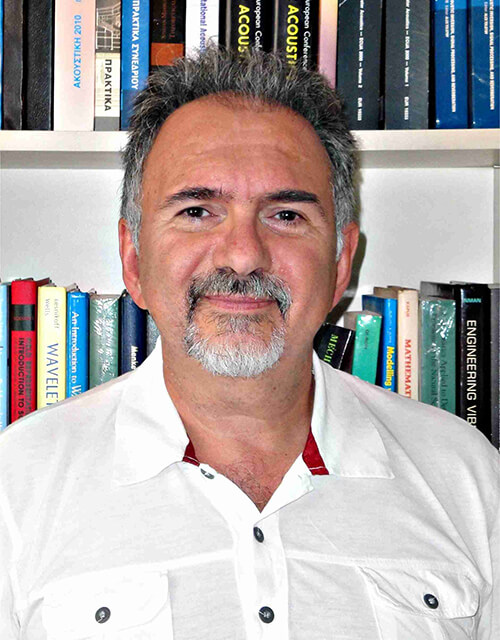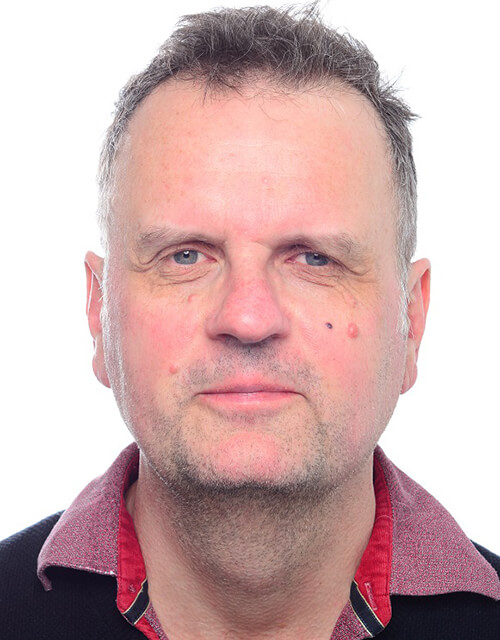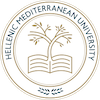
Keynote Speaker: Michael Taroudakis, Professor, University of Crete - Collaborating Faculty member of the Institute of Applied and Computational Mathematics of FORTH
Title: "Seeing" the sea with sounds. Underwater acoustics back in the spotlight
Abstract:
The marine environment covers a huge part of the earth's sphere and is an important factor in determining the quality of our ecosystem. It is practically impenetrable by electromagnetic waves that attenuate very quickly in water and cannot be a means of transmitting any underwater information. For this reason, many marine living creatures, with marine mammals being their main representative, have essentially replaced standard vision with hearing. In fact, they "see" the marine environment with sounds. With sounds they find their food, their companions, communicate with each other and avoid dangers. It took many years for humans to realize the importance of sound in recognizing the marine environment, and when they realized it, they practically began to mimic marine mammals using sounds in a variety of applications. Thus, the area of Underwater Acoustics began as a separate but particularly attractive scientific area of acoustics and researchers realized that it is a very important area of applications for coupling mathematical modeling with modern technology, in order for man to acquire "eyes" in the sea.
The presentation will provide a brief historical overview of the scientific area of Underwater Acoustics, mention modern applications with the necessary tools (theoretical and technological) to deal with it, as well as elements from today's environmental challenges that bring underwater acoustics back to the forefront of interest.
Short CV:
Ο Μιχάλης Ταρουδάκης, είναι Καθηγητής στο Τμήμα Μαθηματικών και Εφαρμοσμένων Μαθηματικών του Πανεπιστημίου Κρήτης και συνεργαζόμενο μέλος ΔΕΠ με το Ινστιτούτο Υπολογιστικών Μαθηματικών του ΙΤΕ.
Γεννήθηκε το 1956 στο Ηράκλειο, στο οποίο ολοκλήρωσε και τις Γυμνασιακές του Σπουδές. Πήρε το δίπλωμα του Ναυπηγού Μηχανολόγου Μηχανικού από το Εθνικό Μετσόβιο Πολυτεχνείο το 1979 και το Διδακτορικό του Δίπλωμα από το ίδιο Ίδρυμα το 1988. Στη συνέχεια διετέλεσε Ερευνητής στο ΙΤΕ, Λέκτορας στο Τμήμα Ναυπηγών Μηχανολόγων Μηχανικών του ΕΜΠ, ενώ υπηρέτησε το Τμήμα Μαθηματικών του Πανεπιστημίου Κρήτης από τις βαθμίδες του Επίκουρου, του Αναπληρωτή και του Καθηγητή.
Το κύριο πεδίο έρευνάς του είναι η Μαθηματική Μοντελοποίηση προβλημάτων κυματικής διάδοσης με κύριο προσανατολισμό την Υποβρύχια Ακουστική και ειδικότερα την Ακουστική Ωκεανογραφία. Σε αυτές τις περιοχές έχει αναπτύξει μεγάλη ερευνητική δραστηριότητα έχοντας συντονίσει ή συμμετάσχει ως κύριος ερευνητής σε μεγάλο αριθμό εθνικών και διεθνών ερευνητικών προγραμμάτων.
Έχει συνεχή παρουσία σε μεγάλα διεθνή επιστημονικά συνέδρια, σε πολλά από τα οποία είναι ο ίδιος Πρόεδρος της Οργανωτικής Επιτροπής, ενώ έχει δημοσιεύσει περισσότερες από 100 εργασίες σε διεθνή επιστημονικά περιοδικά και πρακτικά συνεδρίων.
Έχει μεγάλη διοικητική εμπειρία, καθώς εκτός από τη διδασκαλία μαθημάτων ακουστικής και εφαρμοσμένων μαθηματικών σε προπτυχιακό και μεταπτυχιακό επίπεδο, έχει υπηρετήσει το Πανεπιστήμιο Κρήτης σε όλες τις επίσημες διοικητικές θέσεις του, συμπεριλαμβανομένης αυτής του Πρύτανη του Πανεπιστημίου, του Κοσμήτορα της Σχολής Θετικών και Τεχνολογικών Επιστημών και του Προέδρου του Τμήματος Μαθηματικών.
Έχει διατελέσει Πρόεδρος του Ελληνικού Ινστιτούτου Ακουστικής, της Ευρωπαϊκής Ένωσης Ακουστικής (European Acoustics Association) και της Διεθνούς Επιτροπής Ακουστικής (International Commission for Acoustics). To 2020-2021 συνδιοργάνωσε το 2020-2021 το Διεθνές Έτος Ήχου.
Η προσφορά του στην ακουστική έχει λάβει διεθνή αναγνώριση καθώς εκτός από τις εκλογές στις προαναφερθείσες διοικητικές θέσεις, του έχει απονεμηθεί από την Ευρωπαϊκή Ένωση Ακουστικής το βραβείο της για τη διάδοση της Ακουστικής στην Ευρώπη, από την Πορτογαλική Ακουστική Εταιρεία το Δίπλωμα Αναγνώρισης Δραστηριότητας και από την Ισπανική Ακουστική Εταιρεία το Βραβείο Caracola που απονέμονται σε διακεκριμένους ερευνητές της Ακουστικής. Έχει επίσης αναγορευθεί Εταίρος (Fellow) της Αμερικάνικης Ακουστικής Εταιρείας.
Σημαντική είναι και η Κοινωνική του δράση καθώς είναι Πρόεδρος του Δ.Σ. του Μουσείου Νίκου Καζαντζάκη στη Μυρτιά Ηρακλείου, ενώ έχει διατελέσει μέλος του Διοικητικού Συμβουλίου της Εταιρείας Κρητικών Ιστορικών Μελετών, της Πολιτιστικής Επιτροπής του Δήμου Ηρακλείου και της Επιτροπής Εποπτείας της Βικελαίας Δημοτικής Βιβλιοθήκης Ηρακλείου. Για την κοινωνική του δράση έχει τιμηθεί από τον Μακριότατο Πάπα και Πατριάρχη Αλεξανδρείας και Πάσης Αφρικής Θεόδωρο Β 'με το Μετάλλιο του «Χρυσού Λέοντος Τάξης» του Πατριαρχείου Αλεξανδρείας, καθώς και από την Πρεσβεία της Κίνας στην Αθήνα.

Keynote Speaker: Rolf Bader, Professor, University of Hamburg
Title: Current Challenges and Directions in Musical Acoustics
Abstract:
In recent years, Musical Acoustics has made dramatic advances in physical modeling techniques using Ultrascale Computing methods, such as Graphic Processing Units (GPU) or Field Programmable Gate Arrays (FPGA). These methods allow solving differential equations, including highly nonlinear frequency-dependent viscoelastic damping, pointing to internal damping as maybe even more important than eigenmodes for the sound character of musical instruments. Very recent suggestions for adding Acoustic Metamaterials to musical instruments not only enlarge sonic possibilities but also create sounds that are impossible to produce with conventional musical instruments. Furthermore, contemporary machine learning methodologiess, using psychoacoustic features of timbre perception, addressing the inverse acoustic problem is within reach. Such methodologies will allow estimating how to build a musical instrument starting from sound idle. These advances are accompanied by new nonlinear dynamical models of musical instruments able to predict dynamical processes with much higher precision than linear models. All these recent developments are about to elevate musical instrument crafting to another the level of customer sound-designed instruments with precise spectral and transient properties and sounds, which are impossible to realize with conventional mechanical musical instruments.
Short CV:
Rolf Bader is professor for Systematic Musicology at the University of Hamburg. He also studied Physics, Ethnology, and Historical Musicology. After teaching at Stanford University as a Visiting Scholar, he became full professor for Systematic Musicology in Hamburg since 2007. His main research interests are Physical Modeling of Musical Instruments, Timbre and Rhythm Perception, Brain Dynamics, Musical Signal Processing, Machine Learning, Room Acoustics, or Music Ethnology. He also worked on Self-organization and Synergetics of Musical Instruments and Music Perception. He is the editor of the Springer Handbook of Systematic Musicology, and wrote monographs like Computational Mechanics of the Classical Guitar (Springer 2005) and Nonlinearities and Synchronization in Musical Acoustics and Music Psychology. He is editor-in-chief of the Springer Series Current Research in Systematic Musicology where he also published a monograph, as well as the volume Sound-Perception-Performance and Computational Phonogram Archiving as an editor. He also works as an Ethnomusicologist mainly in Myanmar, Cambodia, China, India or Sri Lanka and is about to build up a Computational Ethnomusicological Sound Archive ESRA at his Institute. He is also a musician and composer in the fields of free improvised and electronic music, as well as Fusion and Rock, and published several CDs.




